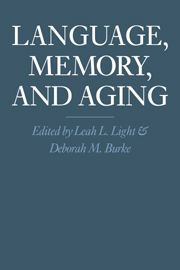Book contents
- Frontmatter
- Contents
- List of contributors
- Preface
- 1 Theories of information processing and theories of aging
- 2 Effects of aging on verbal abilities: Examination of the psychometric literature
- 3 Aging and individual differences in memory for written discourse
- 4 Geriatric psycholinguistics: Syntactic limitations of oral and written language
- 5 Aging and memory activation: The priming of semantic and episodic memories
- 6 Automatic and effortful semantic processes in old age: Experimental and naturalistic approaches
- 7 Integrating information from discourse: Do older adults show deficits?
- 8 Comprehension of pragmatic implications in young and older adults
- 9 Capacity theory and the processing of inferences
- 10 Age differences in memory for texts: Production deficiency or processing limitations?
- 11 Episodic memory and knowledge interactions across adulthood
- 12 The disorder of naming in Alzheimer's disease
- 13 Language and memory processing in senile dementia Alzheimer's type
- 14 Patterns of language and memory in old age
- Author index
- Subject index
Preface
Published online by Cambridge University Press: 05 January 2012
- Frontmatter
- Contents
- List of contributors
- Preface
- 1 Theories of information processing and theories of aging
- 2 Effects of aging on verbal abilities: Examination of the psychometric literature
- 3 Aging and individual differences in memory for written discourse
- 4 Geriatric psycholinguistics: Syntactic limitations of oral and written language
- 5 Aging and memory activation: The priming of semantic and episodic memories
- 6 Automatic and effortful semantic processes in old age: Experimental and naturalistic approaches
- 7 Integrating information from discourse: Do older adults show deficits?
- 8 Comprehension of pragmatic implications in young and older adults
- 9 Capacity theory and the processing of inferences
- 10 Age differences in memory for texts: Production deficiency or processing limitations?
- 11 Episodic memory and knowledge interactions across adulthood
- 12 The disorder of naming in Alzheimer's disease
- 13 Language and memory processing in senile dementia Alzheimer's type
- 14 Patterns of language and memory in old age
- Author index
- Subject index
Summary
Recent years have seen an upsurge of interest in the psychology of aging, particularly in the area of cognition and aging. Much of the experimental research on cognitive aging has dealt with memory, perhaps because of older adults' proverbial complaints about their memory problems. Relatively little has been published on language in the elderly. However, the overlap in mental operations involved in memory and in language has become clear as cognitive psychologists focus on memory for complex linguistic materials such as texts, and as they develop models of natural language comprehension and production. Within the aging literature, there are findings that implicate age-related changes in language as the source of impairment in other cognitive domains, specifically memory. It has been hypothesized that older adults have decreased ability to understand language and that this deficit in semantic processing is a cause of age-related differences in memory for new information. On the other hand, it has also been hypothesized that memory deficits in old age impair language comprehension and production.
The goals of this book are twofold, to review selected aspects of research on language in old age and to consider the relation between language and memory in old age. Many of us who have contributed to the book come to the study of language after years of research on memory and aging. This fact has influenced our choice of topics. Our emphasis is on those aspects of language that are important for understanding memory in old age and on those aspects of memory that are most heavily involved in language.
Information
- Type
- Chapter
- Information
- Language, Memory, and Aging , pp. ix - xiiPublisher: Cambridge University PressPrint publication year: 1988
